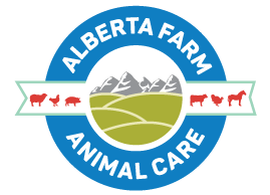(March 15, 2022) The first day of the 2022 Livestock Care Conference was a resounding success! Our keynote speaker Dr. Rebecca Gimenez Husted, owner of Technical Large Animal Rescue Inc., set the tone for the conference with a presentation about how the livestock industry can use the lessons learned from the COVID-19 pandemic and the B.C. floods to plan for future disasters.
“We know that the responsibility for the animals ultimately aligns with their owner, whether it’s a business or an individual,” said Dr. Husted. “So, people really need to start educating themselves and plan how they could handle things in the face of disaster.”
Dr. Husted explained that many people fail to plan until an actual disaster occurs. However, following the events of the past two years, the livestock industry has learned about the importance of planning and sharing information about emergency preparedness with each other.
Dr. Husted mentioned that individuals can prepare for future events by developing organized and devoted emergency efforts. These efforts can include attending local planning meetings, discussing emergency plans with fire chiefs, emergency managers and other community members, taking stock of critical infrastructure and creating biosecurity and safety measures.
“It does take effort. It does take realizing it could happen to you,” said Dr. Husted. “But we find that when people plan, it’s almost like a disaster is a non-disaster.”
Another lesson the livestock industry learned from the B.C. flood disaster was the importance of creating a variety of emergency plans. Dr. Husted mentioned that while some people had created a shelter in place plan during COVID-19, many did not have a plan for moving large animals in the event of a flood.
“That requires a lot of coordination with your local fire department, but it can be done and it has been done,” said Dr. Husted.
Throughout the session, Dr. Husted also talked about the importance of asking for help and using the internet to communicate with others during disasters to avoid personal and financial loss.
“The modern livestock person is connected,” said Dr. Husted. This is especially important in emergency situations because it can save the lives of humans and animals. “For example, many of the stranded farmers in B.C. were unreachable to the outside world and were basically on their own for several days or up to a week later.”
While mentioning the benefits of being connected during an emergency, Dr. Husted gave a nod to AFAC and Alberta’s Emergency Livestock Equipment Trailer program. With 19 trailers, Alberta is currently the most equipped province when it comes to livestock emergencies such as cattle liner rollovers and barn collapses.
“I’m really proud of the effort that your province has made to deal with not only livestock wrecks, but rescue situations where animals are in mud holes and things like that,” said Dr. Husted. “It really makes a difference, and it’s a huge part of emergency planning in Alberta.”
The main takeaways from Dr. Husted’s session were: prepare for emergencies by creating a variety of plans, share emergency plans, communicate with emergency managers and build a community of knowledgeable people to lean on in case of a livestock emergency.
If you missed this session and would like to watch it, a recording will be available for three months following the conference. We’re looking forward to hearing from more experts about PREP (prepare, respond, evaluate, progress) for Livestock Emergencies in the coming days!
